Accounting Information System Report: Artificial Intelligence Impact
VerifiedAdded on 2021/11/16
|10
|2667
|367
Report
AI Summary
This report provides a comprehensive overview of the impact of Artificial Intelligence (AI) on Accounting Information Systems (AIS). It explores the potential of AI to revolutionize accounting practices, including automation, improved accuracy, and enhanced decision-making capabilities. The report delves into the benefits of AI, such as reduced costs and increased productivity, while also addressing the challenges and ethical considerations associated with its implementation. It examines how AI, particularly machine learning, is being utilized to streamline processes like reconciliation, fraud detection, and data-centric tasks. The report emphasizes the importance of accountants developing a strong understanding of AI to leverage its capabilities effectively. The document highlights the need for high-quality data and the economic factors driving AI adoption. Furthermore, it discusses the future of accounting, where AI can free accountants from administrative tasks, enabling them to focus on higher-value advisory services and strategic decision-making. The report concludes by emphasizing the transformative potential of AI in reshaping the accounting profession and improving business outcomes.
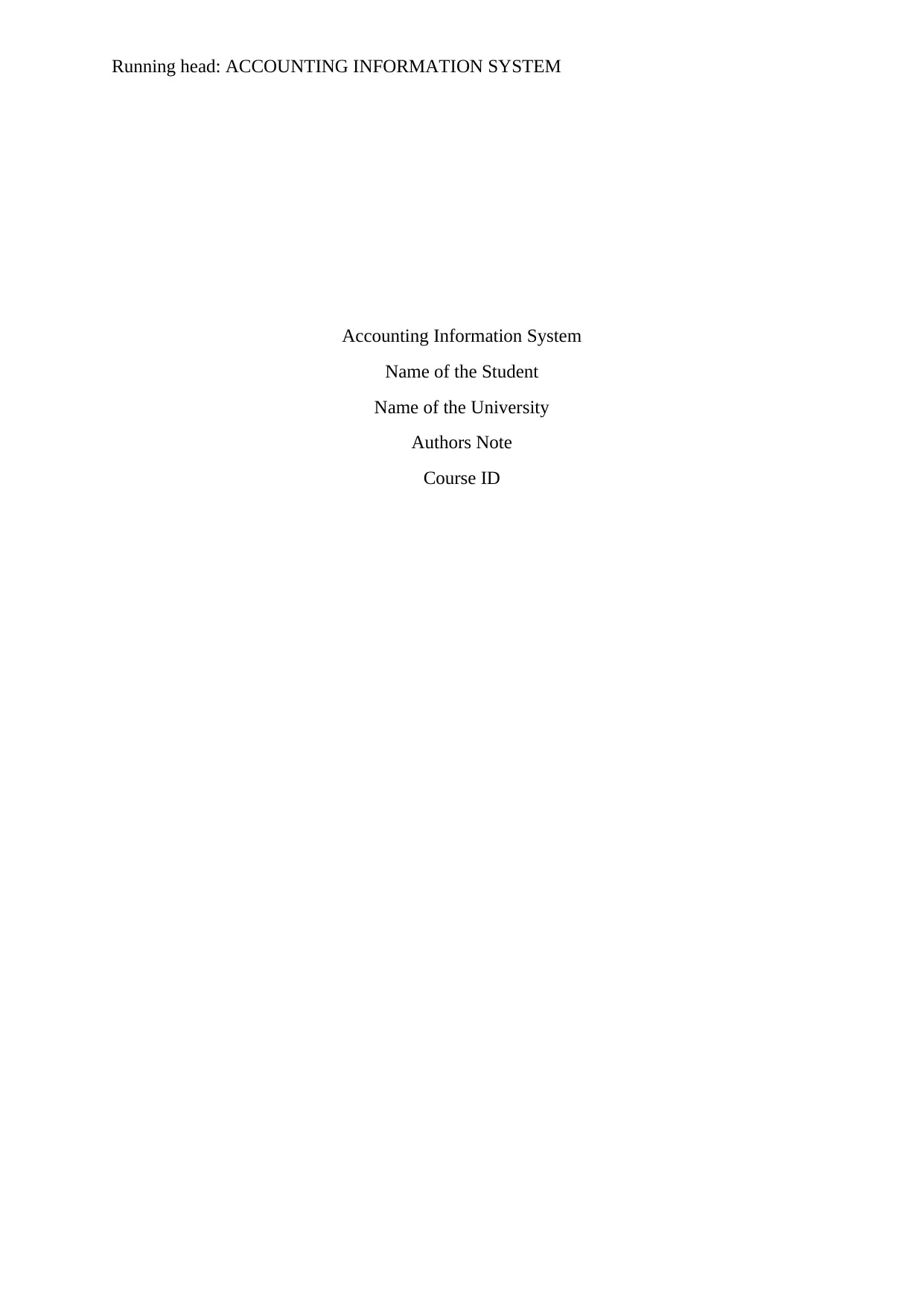
Running head: ACCOUNTING INFORMATION SYSTEM
Accounting Information System
Name of the Student
Name of the University
Authors Note
Course ID
Accounting Information System
Name of the Student
Name of the University
Authors Note
Course ID
Paraphrase This Document
Need a fresh take? Get an instant paraphrase of this document with our AI Paraphraser
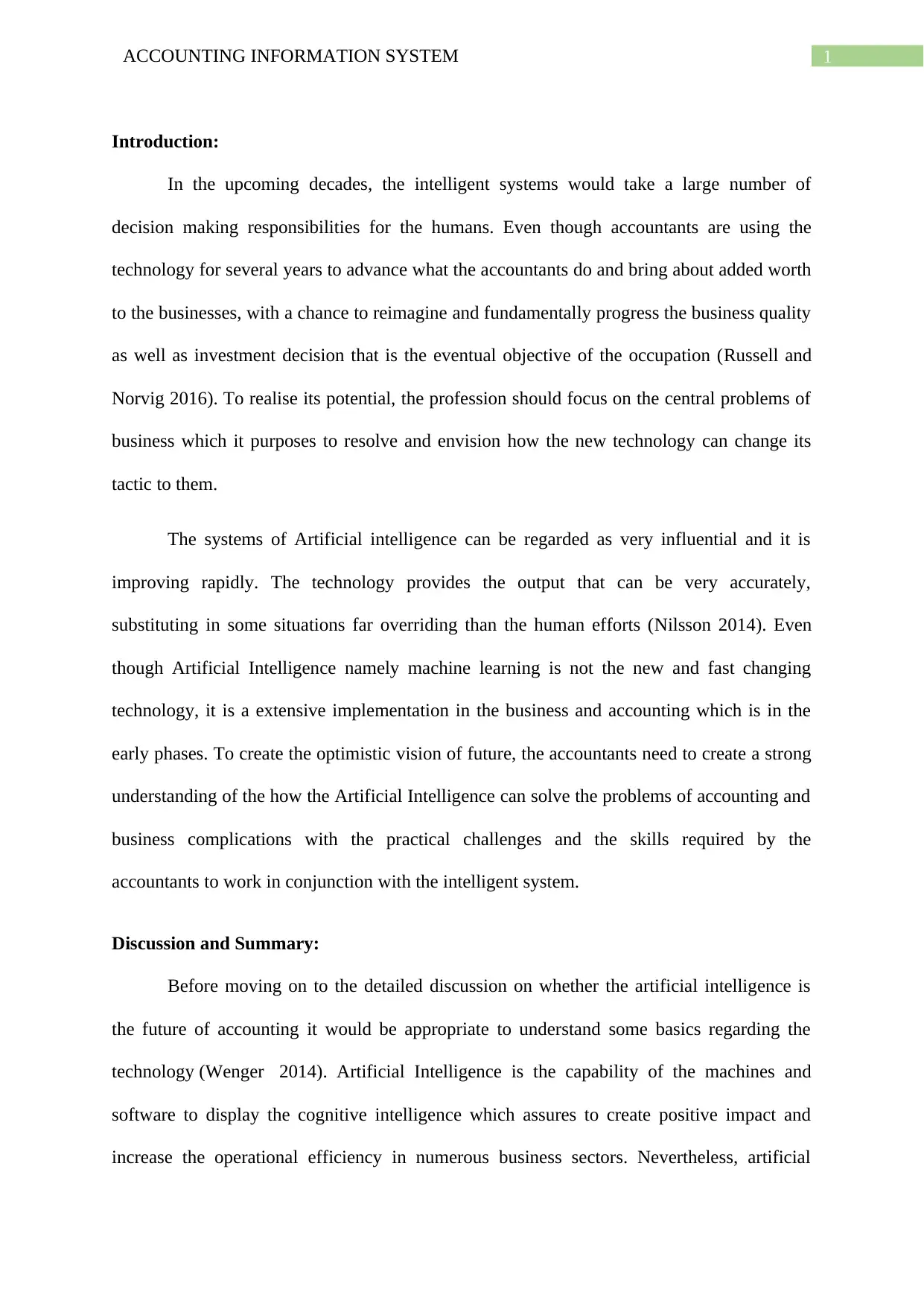
1ACCOUNTING INFORMATION SYSTEM
Introduction:
In the upcoming decades, the intelligent systems would take a large number of
decision making responsibilities for the humans. Even though accountants are using the
technology for several years to advance what the accountants do and bring about added worth
to the businesses, with a chance to reimagine and fundamentally progress the business quality
as well as investment decision that is the eventual objective of the occupation (Russell and
Norvig 2016). To realise its potential, the profession should focus on the central problems of
business which it purposes to resolve and envision how the new technology can change its
tactic to them.
The systems of Artificial intelligence can be regarded as very influential and it is
improving rapidly. The technology provides the output that can be very accurately,
substituting in some situations far overriding than the human efforts (Nilsson 2014). Even
though Artificial Intelligence namely machine learning is not the new and fast changing
technology, it is a extensive implementation in the business and accounting which is in the
early phases. To create the optimistic vision of future, the accountants need to create a strong
understanding of the how the Artificial Intelligence can solve the problems of accounting and
business complications with the practical challenges and the skills required by the
accountants to work in conjunction with the intelligent system.
Discussion and Summary:
Before moving on to the detailed discussion on whether the artificial intelligence is
the future of accounting it would be appropriate to understand some basics regarding the
technology (Wenger 2014). Artificial Intelligence is the capability of the machines and
software to display the cognitive intelligence which assures to create positive impact and
increase the operational efficiency in numerous business sectors. Nevertheless, artificial
Introduction:
In the upcoming decades, the intelligent systems would take a large number of
decision making responsibilities for the humans. Even though accountants are using the
technology for several years to advance what the accountants do and bring about added worth
to the businesses, with a chance to reimagine and fundamentally progress the business quality
as well as investment decision that is the eventual objective of the occupation (Russell and
Norvig 2016). To realise its potential, the profession should focus on the central problems of
business which it purposes to resolve and envision how the new technology can change its
tactic to them.
The systems of Artificial intelligence can be regarded as very influential and it is
improving rapidly. The technology provides the output that can be very accurately,
substituting in some situations far overriding than the human efforts (Nilsson 2014). Even
though Artificial Intelligence namely machine learning is not the new and fast changing
technology, it is a extensive implementation in the business and accounting which is in the
early phases. To create the optimistic vision of future, the accountants need to create a strong
understanding of the how the Artificial Intelligence can solve the problems of accounting and
business complications with the practical challenges and the skills required by the
accountants to work in conjunction with the intelligent system.
Discussion and Summary:
Before moving on to the detailed discussion on whether the artificial intelligence is
the future of accounting it would be appropriate to understand some basics regarding the
technology (Wenger 2014). Artificial Intelligence is the capability of the machines and
software to display the cognitive intelligence which assures to create positive impact and
increase the operational efficiency in numerous business sectors. Nevertheless, artificial
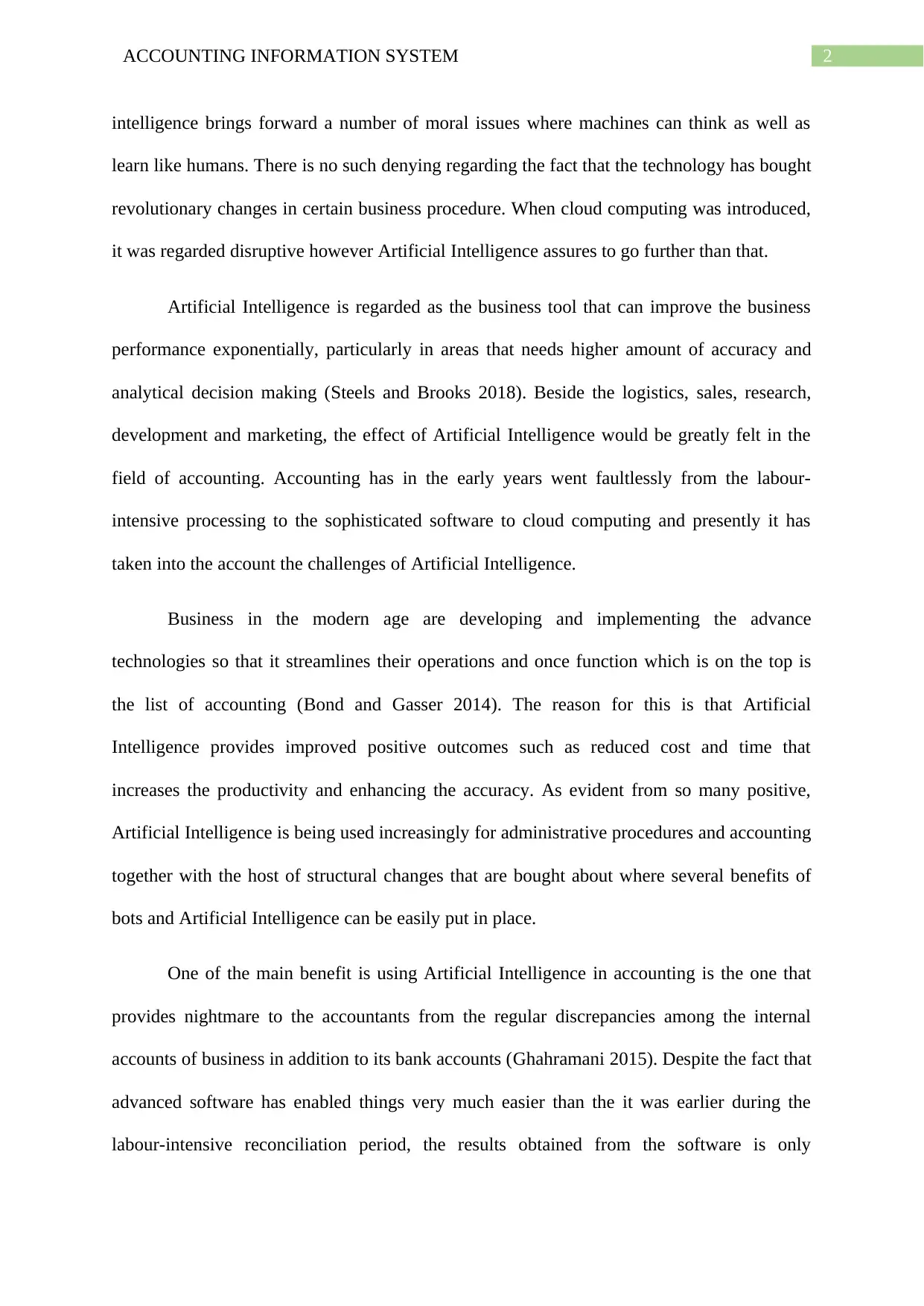
2ACCOUNTING INFORMATION SYSTEM
intelligence brings forward a number of moral issues where machines can think as well as
learn like humans. There is no such denying regarding the fact that the technology has bought
revolutionary changes in certain business procedure. When cloud computing was introduced,
it was regarded disruptive however Artificial Intelligence assures to go further than that.
Artificial Intelligence is regarded as the business tool that can improve the business
performance exponentially, particularly in areas that needs higher amount of accuracy and
analytical decision making (Steels and Brooks 2018). Beside the logistics, sales, research,
development and marketing, the effect of Artificial Intelligence would be greatly felt in the
field of accounting. Accounting has in the early years went faultlessly from the labour-
intensive processing to the sophisticated software to cloud computing and presently it has
taken into the account the challenges of Artificial Intelligence.
Business in the modern age are developing and implementing the advance
technologies so that it streamlines their operations and once function which is on the top is
the list of accounting (Bond and Gasser 2014). The reason for this is that Artificial
Intelligence provides improved positive outcomes such as reduced cost and time that
increases the productivity and enhancing the accuracy. As evident from so many positive,
Artificial Intelligence is being used increasingly for administrative procedures and accounting
together with the host of structural changes that are bought about where several benefits of
bots and Artificial Intelligence can be easily put in place.
One of the main benefit is using Artificial Intelligence in accounting is the one that
provides nightmare to the accountants from the regular discrepancies among the internal
accounts of business in addition to its bank accounts (Ghahramani 2015). Despite the fact that
advanced software has enabled things very much easier than the it was earlier during the
labour-intensive reconciliation period, the results obtained from the software is only
intelligence brings forward a number of moral issues where machines can think as well as
learn like humans. There is no such denying regarding the fact that the technology has bought
revolutionary changes in certain business procedure. When cloud computing was introduced,
it was regarded disruptive however Artificial Intelligence assures to go further than that.
Artificial Intelligence is regarded as the business tool that can improve the business
performance exponentially, particularly in areas that needs higher amount of accuracy and
analytical decision making (Steels and Brooks 2018). Beside the logistics, sales, research,
development and marketing, the effect of Artificial Intelligence would be greatly felt in the
field of accounting. Accounting has in the early years went faultlessly from the labour-
intensive processing to the sophisticated software to cloud computing and presently it has
taken into the account the challenges of Artificial Intelligence.
Business in the modern age are developing and implementing the advance
technologies so that it streamlines their operations and once function which is on the top is
the list of accounting (Bond and Gasser 2014). The reason for this is that Artificial
Intelligence provides improved positive outcomes such as reduced cost and time that
increases the productivity and enhancing the accuracy. As evident from so many positive,
Artificial Intelligence is being used increasingly for administrative procedures and accounting
together with the host of structural changes that are bought about where several benefits of
bots and Artificial Intelligence can be easily put in place.
One of the main benefit is using Artificial Intelligence in accounting is the one that
provides nightmare to the accountants from the regular discrepancies among the internal
accounts of business in addition to its bank accounts (Ghahramani 2015). Despite the fact that
advanced software has enabled things very much easier than the it was earlier during the
labour-intensive reconciliation period, the results obtained from the software is only
⊘ This is a preview!⊘
Do you want full access?
Subscribe today to unlock all pages.

Trusted by 1+ million students worldwide
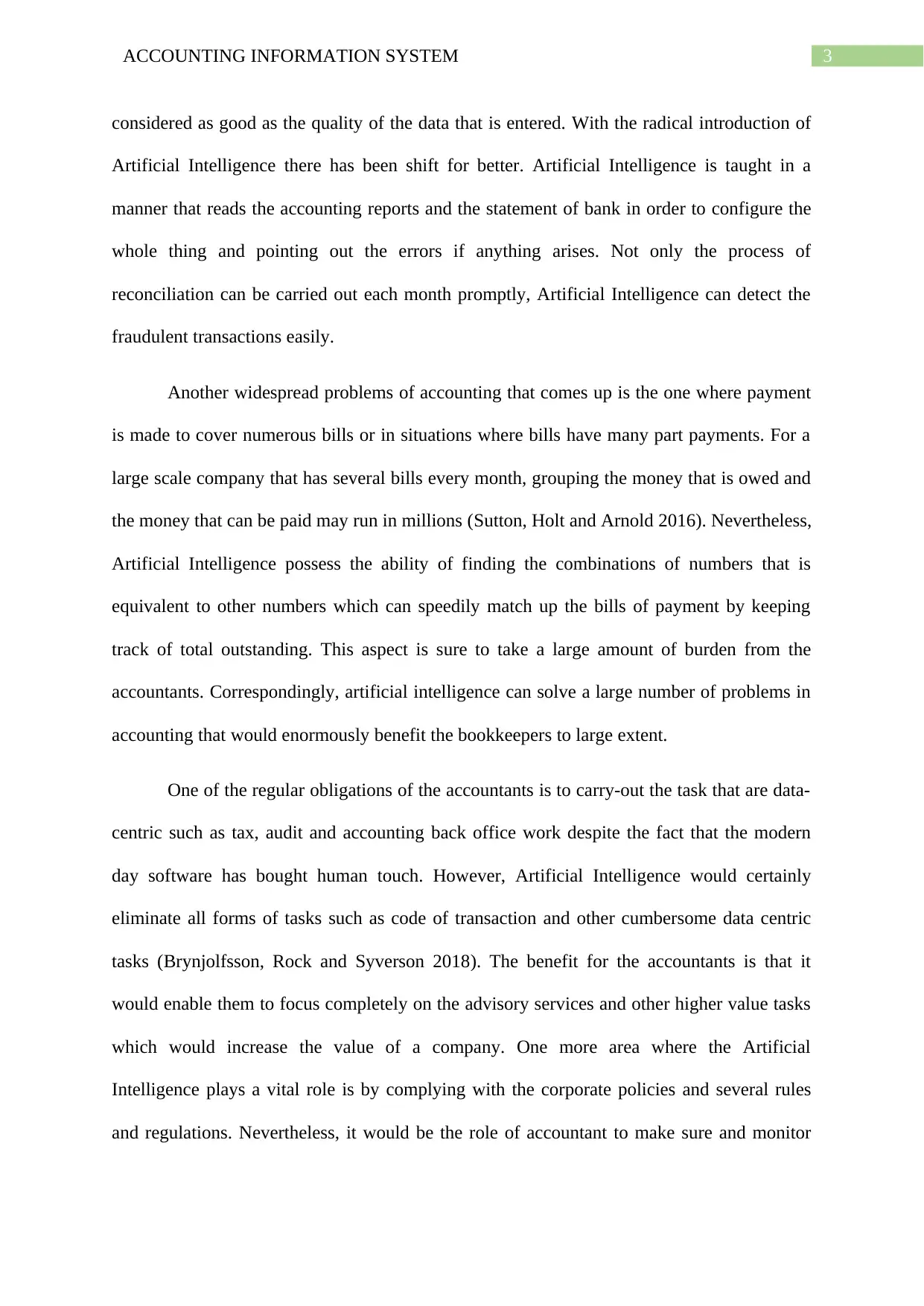
3ACCOUNTING INFORMATION SYSTEM
considered as good as the quality of the data that is entered. With the radical introduction of
Artificial Intelligence there has been shift for better. Artificial Intelligence is taught in a
manner that reads the accounting reports and the statement of bank in order to configure the
whole thing and pointing out the errors if anything arises. Not only the process of
reconciliation can be carried out each month promptly, Artificial Intelligence can detect the
fraudulent transactions easily.
Another widespread problems of accounting that comes up is the one where payment
is made to cover numerous bills or in situations where bills have many part payments. For a
large scale company that has several bills every month, grouping the money that is owed and
the money that can be paid may run in millions (Sutton, Holt and Arnold 2016). Nevertheless,
Artificial Intelligence possess the ability of finding the combinations of numbers that is
equivalent to other numbers which can speedily match up the bills of payment by keeping
track of total outstanding. This aspect is sure to take a large amount of burden from the
accountants. Correspondingly, artificial intelligence can solve a large number of problems in
accounting that would enormously benefit the bookkeepers to large extent.
One of the regular obligations of the accountants is to carry-out the task that are data-
centric such as tax, audit and accounting back office work despite the fact that the modern
day software has bought human touch. However, Artificial Intelligence would certainly
eliminate all forms of tasks such as code of transaction and other cumbersome data centric
tasks (Brynjolfsson, Rock and Syverson 2018). The benefit for the accountants is that it
would enable them to focus completely on the advisory services and other higher value tasks
which would increase the value of a company. One more area where the Artificial
Intelligence plays a vital role is by complying with the corporate policies and several rules
and regulations. Nevertheless, it would be the role of accountant to make sure and monitor
considered as good as the quality of the data that is entered. With the radical introduction of
Artificial Intelligence there has been shift for better. Artificial Intelligence is taught in a
manner that reads the accounting reports and the statement of bank in order to configure the
whole thing and pointing out the errors if anything arises. Not only the process of
reconciliation can be carried out each month promptly, Artificial Intelligence can detect the
fraudulent transactions easily.
Another widespread problems of accounting that comes up is the one where payment
is made to cover numerous bills or in situations where bills have many part payments. For a
large scale company that has several bills every month, grouping the money that is owed and
the money that can be paid may run in millions (Sutton, Holt and Arnold 2016). Nevertheless,
Artificial Intelligence possess the ability of finding the combinations of numbers that is
equivalent to other numbers which can speedily match up the bills of payment by keeping
track of total outstanding. This aspect is sure to take a large amount of burden from the
accountants. Correspondingly, artificial intelligence can solve a large number of problems in
accounting that would enormously benefit the bookkeepers to large extent.
One of the regular obligations of the accountants is to carry-out the task that are data-
centric such as tax, audit and accounting back office work despite the fact that the modern
day software has bought human touch. However, Artificial Intelligence would certainly
eliminate all forms of tasks such as code of transaction and other cumbersome data centric
tasks (Brynjolfsson, Rock and Syverson 2018). The benefit for the accountants is that it
would enable them to focus completely on the advisory services and other higher value tasks
which would increase the value of a company. One more area where the Artificial
Intelligence plays a vital role is by complying with the corporate policies and several rules
and regulations. Nevertheless, it would be the role of accountant to make sure and monitor
Paraphrase This Document
Need a fresh take? Get an instant paraphrase of this document with our AI Paraphraser
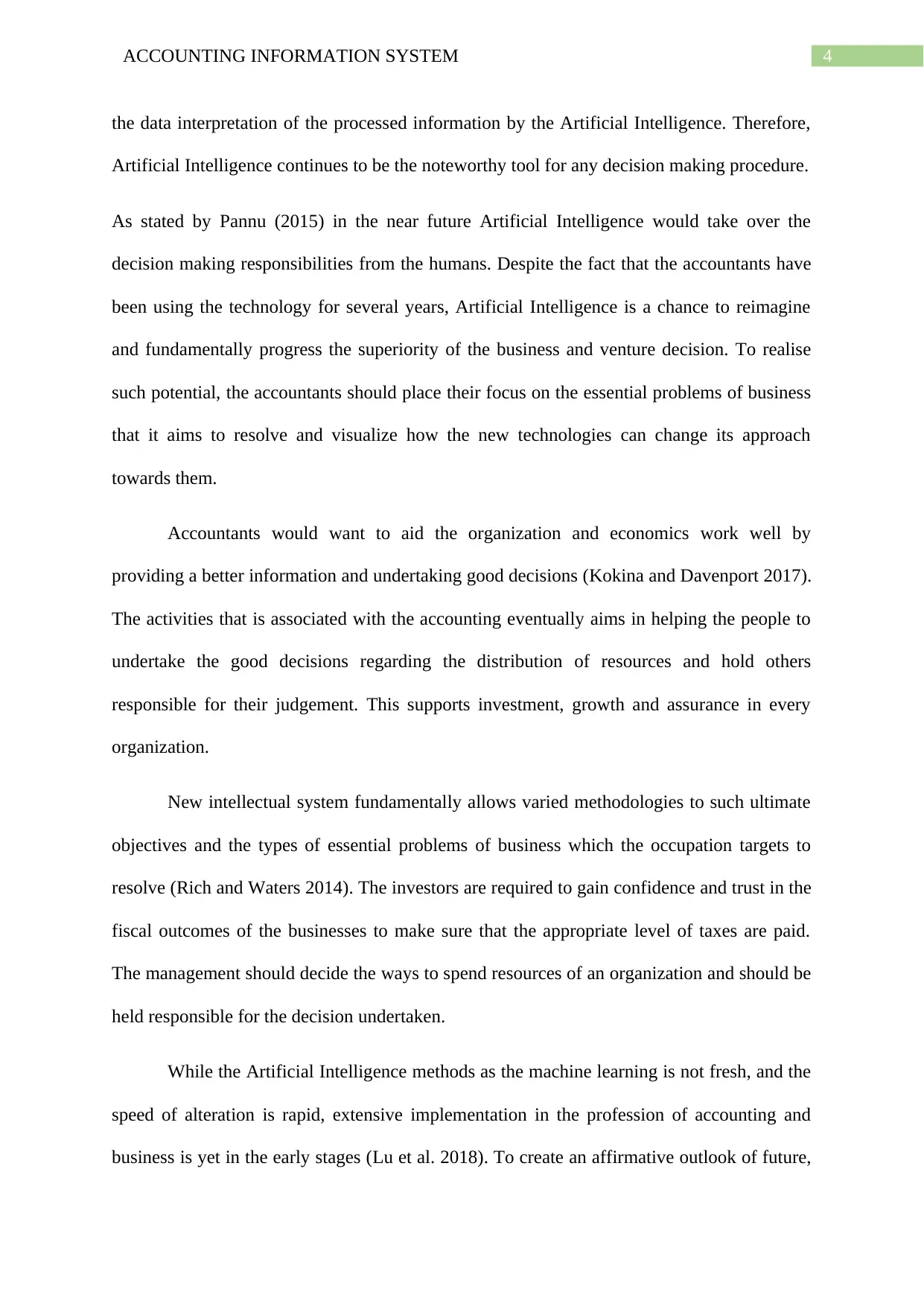
4ACCOUNTING INFORMATION SYSTEM
the data interpretation of the processed information by the Artificial Intelligence. Therefore,
Artificial Intelligence continues to be the noteworthy tool for any decision making procedure.
As stated by Pannu (2015) in the near future Artificial Intelligence would take over the
decision making responsibilities from the humans. Despite the fact that the accountants have
been using the technology for several years, Artificial Intelligence is a chance to reimagine
and fundamentally progress the superiority of the business and venture decision. To realise
such potential, the accountants should place their focus on the essential problems of business
that it aims to resolve and visualize how the new technologies can change its approach
towards them.
Accountants would want to aid the organization and economics work well by
providing a better information and undertaking good decisions (Kokina and Davenport 2017).
The activities that is associated with the accounting eventually aims in helping the people to
undertake the good decisions regarding the distribution of resources and hold others
responsible for their judgement. This supports investment, growth and assurance in every
organization.
New intellectual system fundamentally allows varied methodologies to such ultimate
objectives and the types of essential problems of business which the occupation targets to
resolve (Rich and Waters 2014). The investors are required to gain confidence and trust in the
fiscal outcomes of the businesses to make sure that the appropriate level of taxes are paid.
The management should decide the ways to spend resources of an organization and should be
held responsible for the decision undertaken.
While the Artificial Intelligence methods as the machine learning is not fresh, and the
speed of alteration is rapid, extensive implementation in the profession of accounting and
business is yet in the early stages (Lu et al. 2018). To create an affirmative outlook of future,
the data interpretation of the processed information by the Artificial Intelligence. Therefore,
Artificial Intelligence continues to be the noteworthy tool for any decision making procedure.
As stated by Pannu (2015) in the near future Artificial Intelligence would take over the
decision making responsibilities from the humans. Despite the fact that the accountants have
been using the technology for several years, Artificial Intelligence is a chance to reimagine
and fundamentally progress the superiority of the business and venture decision. To realise
such potential, the accountants should place their focus on the essential problems of business
that it aims to resolve and visualize how the new technologies can change its approach
towards them.
Accountants would want to aid the organization and economics work well by
providing a better information and undertaking good decisions (Kokina and Davenport 2017).
The activities that is associated with the accounting eventually aims in helping the people to
undertake the good decisions regarding the distribution of resources and hold others
responsible for their judgement. This supports investment, growth and assurance in every
organization.
New intellectual system fundamentally allows varied methodologies to such ultimate
objectives and the types of essential problems of business which the occupation targets to
resolve (Rich and Waters 2014). The investors are required to gain confidence and trust in the
fiscal outcomes of the businesses to make sure that the appropriate level of taxes are paid.
The management should decide the ways to spend resources of an organization and should be
held responsible for the decision undertaken.
While the Artificial Intelligence methods as the machine learning is not fresh, and the
speed of alteration is rapid, extensive implementation in the profession of accounting and
business is yet in the early stages (Lu et al. 2018). To create an affirmative outlook of future,
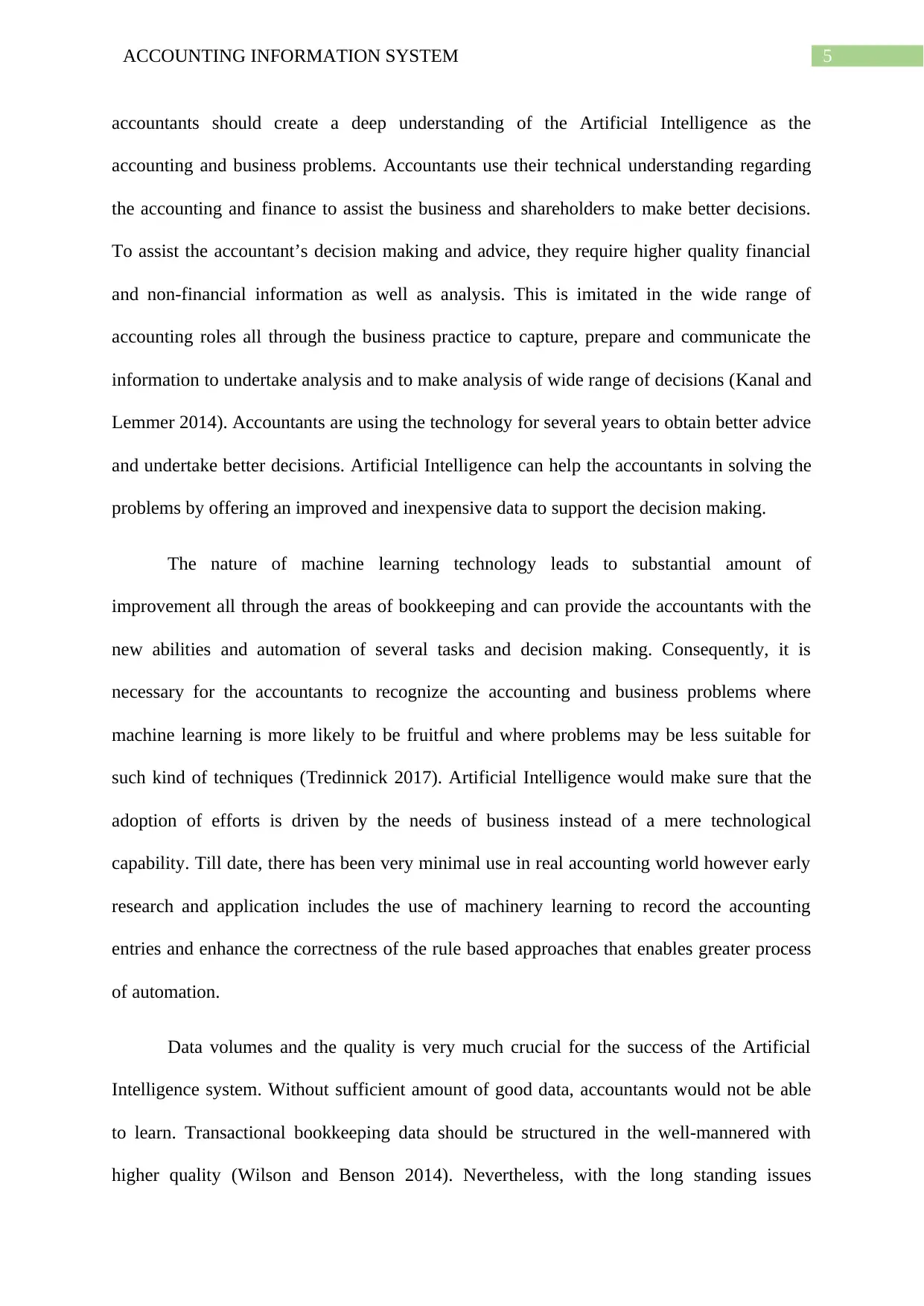
5ACCOUNTING INFORMATION SYSTEM
accountants should create a deep understanding of the Artificial Intelligence as the
accounting and business problems. Accountants use their technical understanding regarding
the accounting and finance to assist the business and shareholders to make better decisions.
To assist the accountant’s decision making and advice, they require higher quality financial
and non-financial information as well as analysis. This is imitated in the wide range of
accounting roles all through the business practice to capture, prepare and communicate the
information to undertake analysis and to make analysis of wide range of decisions (Kanal and
Lemmer 2014). Accountants are using the technology for several years to obtain better advice
and undertake better decisions. Artificial Intelligence can help the accountants in solving the
problems by offering an improved and inexpensive data to support the decision making.
The nature of machine learning technology leads to substantial amount of
improvement all through the areas of bookkeeping and can provide the accountants with the
new abilities and automation of several tasks and decision making. Consequently, it is
necessary for the accountants to recognize the accounting and business problems where
machine learning is more likely to be fruitful and where problems may be less suitable for
such kind of techniques (Tredinnick 2017). Artificial Intelligence would make sure that the
adoption of efforts is driven by the needs of business instead of a mere technological
capability. Till date, there has been very minimal use in real accounting world however early
research and application includes the use of machinery learning to record the accounting
entries and enhance the correctness of the rule based approaches that enables greater process
of automation.
Data volumes and the quality is very much crucial for the success of the Artificial
Intelligence system. Without sufficient amount of good data, accountants would not be able
to learn. Transactional bookkeeping data should be structured in the well-mannered with
higher quality (Wilson and Benson 2014). Nevertheless, with the long standing issues
accountants should create a deep understanding of the Artificial Intelligence as the
accounting and business problems. Accountants use their technical understanding regarding
the accounting and finance to assist the business and shareholders to make better decisions.
To assist the accountant’s decision making and advice, they require higher quality financial
and non-financial information as well as analysis. This is imitated in the wide range of
accounting roles all through the business practice to capture, prepare and communicate the
information to undertake analysis and to make analysis of wide range of decisions (Kanal and
Lemmer 2014). Accountants are using the technology for several years to obtain better advice
and undertake better decisions. Artificial Intelligence can help the accountants in solving the
problems by offering an improved and inexpensive data to support the decision making.
The nature of machine learning technology leads to substantial amount of
improvement all through the areas of bookkeeping and can provide the accountants with the
new abilities and automation of several tasks and decision making. Consequently, it is
necessary for the accountants to recognize the accounting and business problems where
machine learning is more likely to be fruitful and where problems may be less suitable for
such kind of techniques (Tredinnick 2017). Artificial Intelligence would make sure that the
adoption of efforts is driven by the needs of business instead of a mere technological
capability. Till date, there has been very minimal use in real accounting world however early
research and application includes the use of machinery learning to record the accounting
entries and enhance the correctness of the rule based approaches that enables greater process
of automation.
Data volumes and the quality is very much crucial for the success of the Artificial
Intelligence system. Without sufficient amount of good data, accountants would not be able
to learn. Transactional bookkeeping data should be structured in the well-mannered with
higher quality (Wilson and Benson 2014). Nevertheless, with the long standing issues
⊘ This is a preview!⊘
Do you want full access?
Subscribe today to unlock all pages.

Trusted by 1+ million students worldwide
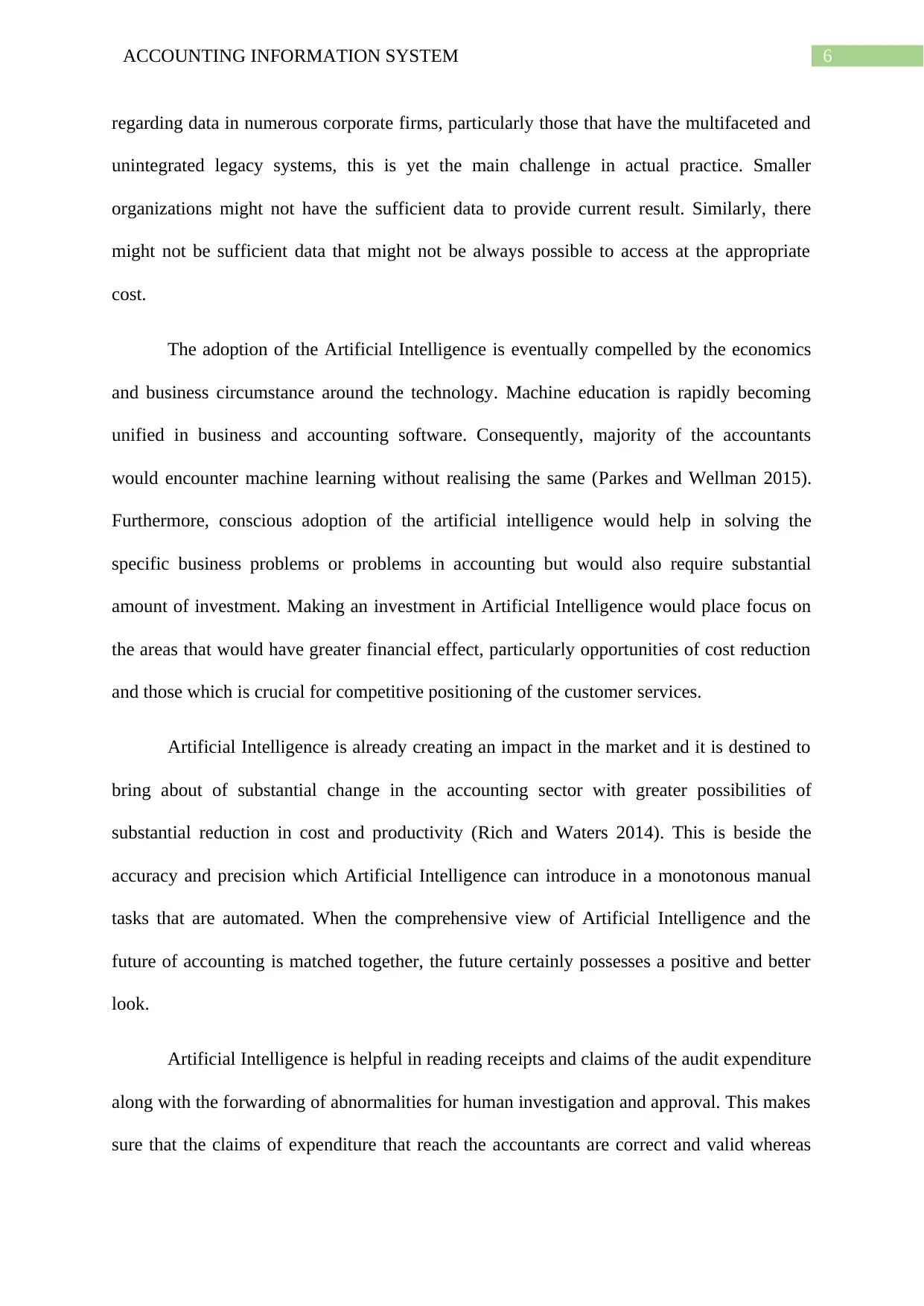
6ACCOUNTING INFORMATION SYSTEM
regarding data in numerous corporate firms, particularly those that have the multifaceted and
unintegrated legacy systems, this is yet the main challenge in actual practice. Smaller
organizations might not have the sufficient data to provide current result. Similarly, there
might not be sufficient data that might not be always possible to access at the appropriate
cost.
The adoption of the Artificial Intelligence is eventually compelled by the economics
and business circumstance around the technology. Machine education is rapidly becoming
unified in business and accounting software. Consequently, majority of the accountants
would encounter machine learning without realising the same (Parkes and Wellman 2015).
Furthermore, conscious adoption of the artificial intelligence would help in solving the
specific business problems or problems in accounting but would also require substantial
amount of investment. Making an investment in Artificial Intelligence would place focus on
the areas that would have greater financial effect, particularly opportunities of cost reduction
and those which is crucial for competitive positioning of the customer services.
Artificial Intelligence is already creating an impact in the market and it is destined to
bring about of substantial change in the accounting sector with greater possibilities of
substantial reduction in cost and productivity (Rich and Waters 2014). This is beside the
accuracy and precision which Artificial Intelligence can introduce in a monotonous manual
tasks that are automated. When the comprehensive view of Artificial Intelligence and the
future of accounting is matched together, the future certainly possesses a positive and better
look.
Artificial Intelligence is helpful in reading receipts and claims of the audit expenditure
along with the forwarding of abnormalities for human investigation and approval. This makes
sure that the claims of expenditure that reach the accountants are correct and valid whereas
regarding data in numerous corporate firms, particularly those that have the multifaceted and
unintegrated legacy systems, this is yet the main challenge in actual practice. Smaller
organizations might not have the sufficient data to provide current result. Similarly, there
might not be sufficient data that might not be always possible to access at the appropriate
cost.
The adoption of the Artificial Intelligence is eventually compelled by the economics
and business circumstance around the technology. Machine education is rapidly becoming
unified in business and accounting software. Consequently, majority of the accountants
would encounter machine learning without realising the same (Parkes and Wellman 2015).
Furthermore, conscious adoption of the artificial intelligence would help in solving the
specific business problems or problems in accounting but would also require substantial
amount of investment. Making an investment in Artificial Intelligence would place focus on
the areas that would have greater financial effect, particularly opportunities of cost reduction
and those which is crucial for competitive positioning of the customer services.
Artificial Intelligence is already creating an impact in the market and it is destined to
bring about of substantial change in the accounting sector with greater possibilities of
substantial reduction in cost and productivity (Rich and Waters 2014). This is beside the
accuracy and precision which Artificial Intelligence can introduce in a monotonous manual
tasks that are automated. When the comprehensive view of Artificial Intelligence and the
future of accounting is matched together, the future certainly possesses a positive and better
look.
Artificial Intelligence is helpful in reading receipts and claims of the audit expenditure
along with the forwarding of abnormalities for human investigation and approval. This makes
sure that the claims of expenditure that reach the accountants are correct and valid whereas
Paraphrase This Document
Need a fresh take? Get an instant paraphrase of this document with our AI Paraphraser
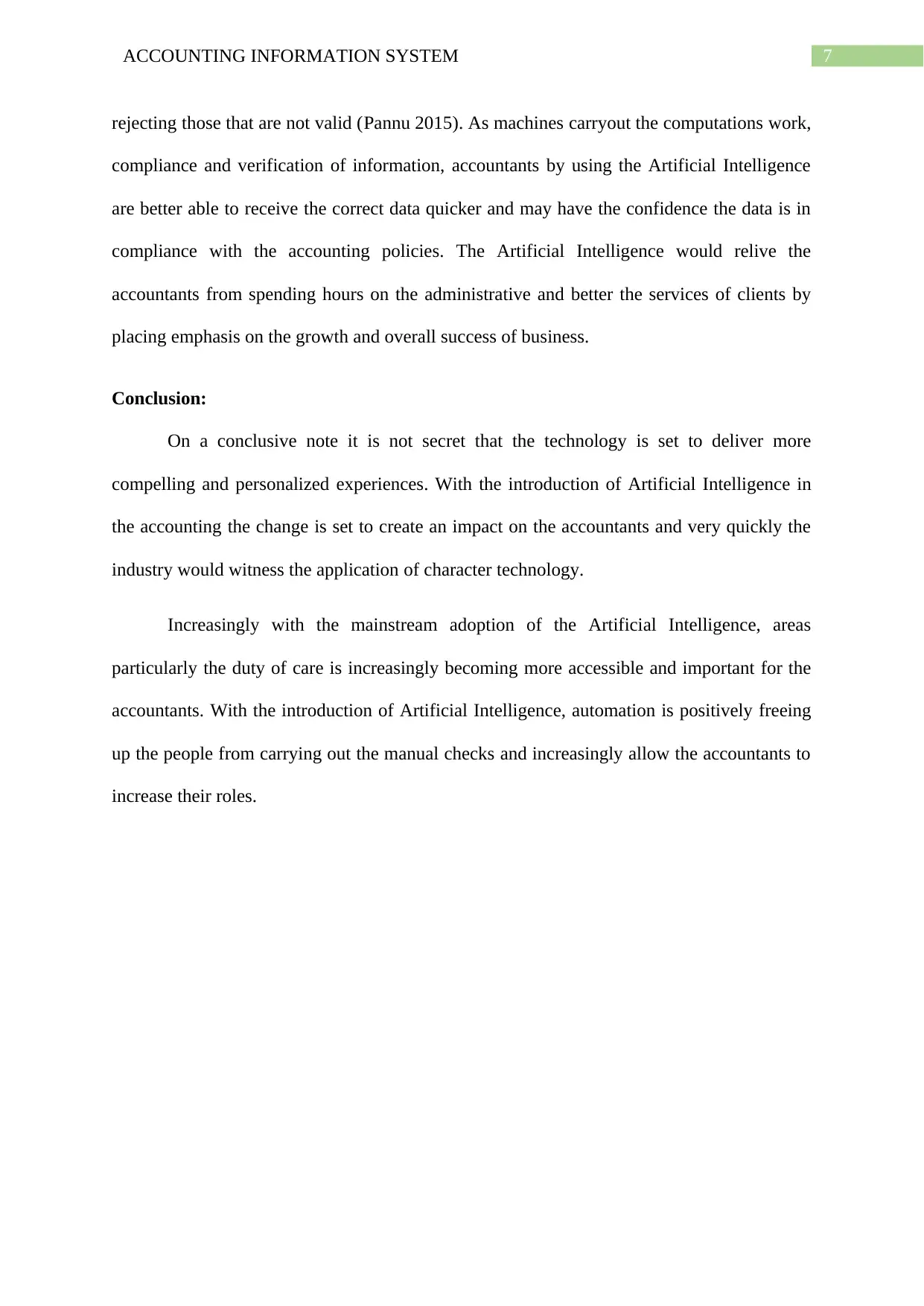
7ACCOUNTING INFORMATION SYSTEM
rejecting those that are not valid (Pannu 2015). As machines carryout the computations work,
compliance and verification of information, accountants by using the Artificial Intelligence
are better able to receive the correct data quicker and may have the confidence the data is in
compliance with the accounting policies. The Artificial Intelligence would relive the
accountants from spending hours on the administrative and better the services of clients by
placing emphasis on the growth and overall success of business.
Conclusion:
On a conclusive note it is not secret that the technology is set to deliver more
compelling and personalized experiences. With the introduction of Artificial Intelligence in
the accounting the change is set to create an impact on the accountants and very quickly the
industry would witness the application of character technology.
Increasingly with the mainstream adoption of the Artificial Intelligence, areas
particularly the duty of care is increasingly becoming more accessible and important for the
accountants. With the introduction of Artificial Intelligence, automation is positively freeing
up the people from carrying out the manual checks and increasingly allow the accountants to
increase their roles.
rejecting those that are not valid (Pannu 2015). As machines carryout the computations work,
compliance and verification of information, accountants by using the Artificial Intelligence
are better able to receive the correct data quicker and may have the confidence the data is in
compliance with the accounting policies. The Artificial Intelligence would relive the
accountants from spending hours on the administrative and better the services of clients by
placing emphasis on the growth and overall success of business.
Conclusion:
On a conclusive note it is not secret that the technology is set to deliver more
compelling and personalized experiences. With the introduction of Artificial Intelligence in
the accounting the change is set to create an impact on the accountants and very quickly the
industry would witness the application of character technology.
Increasingly with the mainstream adoption of the Artificial Intelligence, areas
particularly the duty of care is increasingly becoming more accessible and important for the
accountants. With the introduction of Artificial Intelligence, automation is positively freeing
up the people from carrying out the manual checks and increasingly allow the accountants to
increase their roles.
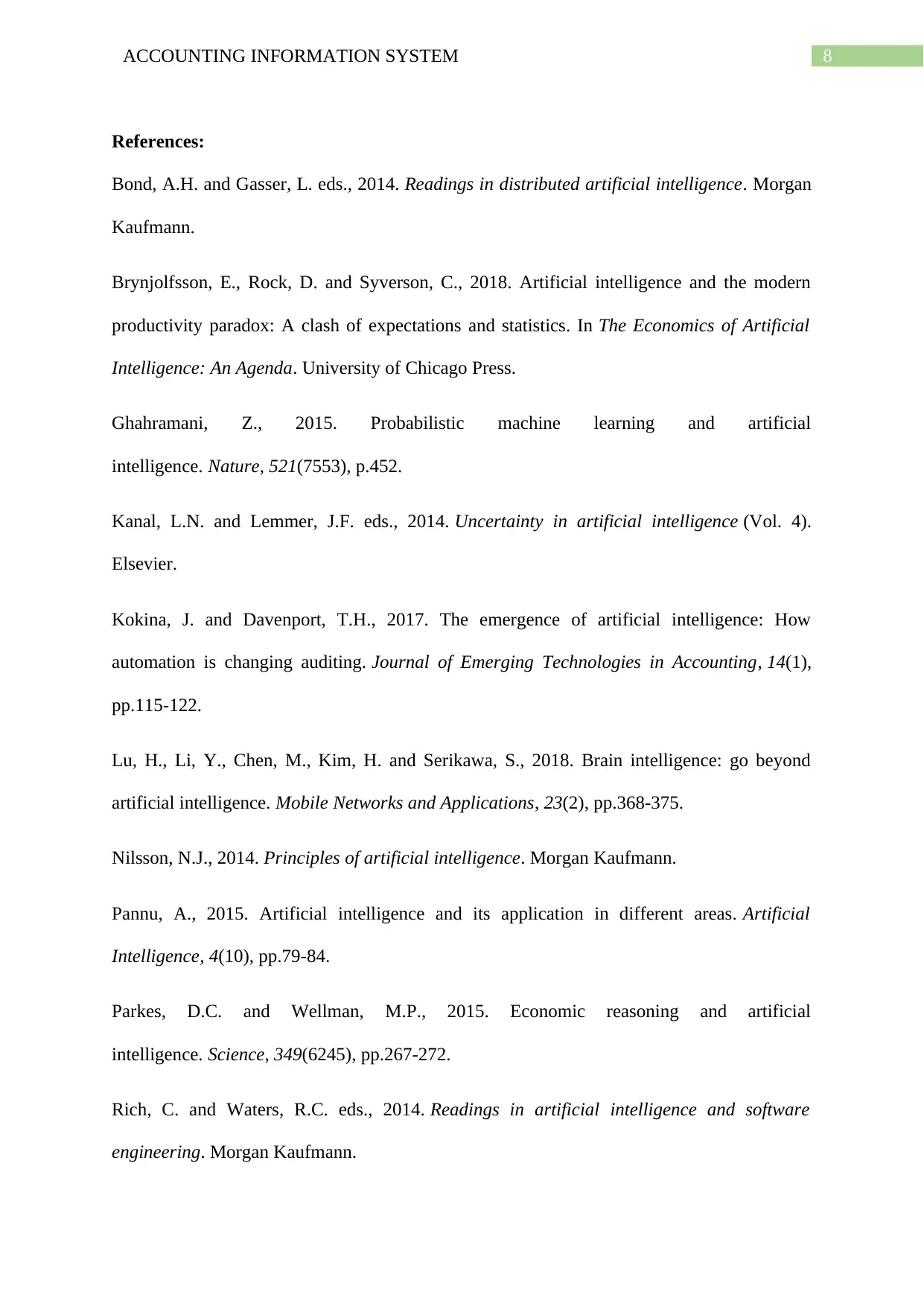
8ACCOUNTING INFORMATION SYSTEM
References:
Bond, A.H. and Gasser, L. eds., 2014. Readings in distributed artificial intelligence. Morgan
Kaufmann.
Brynjolfsson, E., Rock, D. and Syverson, C., 2018. Artificial intelligence and the modern
productivity paradox: A clash of expectations and statistics. In The Economics of Artificial
Intelligence: An Agenda. University of Chicago Press.
Ghahramani, Z., 2015. Probabilistic machine learning and artificial
intelligence. Nature, 521(7553), p.452.
Kanal, L.N. and Lemmer, J.F. eds., 2014. Uncertainty in artificial intelligence (Vol. 4).
Elsevier.
Kokina, J. and Davenport, T.H., 2017. The emergence of artificial intelligence: How
automation is changing auditing. Journal of Emerging Technologies in Accounting, 14(1),
pp.115-122.
Lu, H., Li, Y., Chen, M., Kim, H. and Serikawa, S., 2018. Brain intelligence: go beyond
artificial intelligence. Mobile Networks and Applications, 23(2), pp.368-375.
Nilsson, N.J., 2014. Principles of artificial intelligence. Morgan Kaufmann.
Pannu, A., 2015. Artificial intelligence and its application in different areas. Artificial
Intelligence, 4(10), pp.79-84.
Parkes, D.C. and Wellman, M.P., 2015. Economic reasoning and artificial
intelligence. Science, 349(6245), pp.267-272.
Rich, C. and Waters, R.C. eds., 2014. Readings in artificial intelligence and software
engineering. Morgan Kaufmann.
References:
Bond, A.H. and Gasser, L. eds., 2014. Readings in distributed artificial intelligence. Morgan
Kaufmann.
Brynjolfsson, E., Rock, D. and Syverson, C., 2018. Artificial intelligence and the modern
productivity paradox: A clash of expectations and statistics. In The Economics of Artificial
Intelligence: An Agenda. University of Chicago Press.
Ghahramani, Z., 2015. Probabilistic machine learning and artificial
intelligence. Nature, 521(7553), p.452.
Kanal, L.N. and Lemmer, J.F. eds., 2014. Uncertainty in artificial intelligence (Vol. 4).
Elsevier.
Kokina, J. and Davenport, T.H., 2017. The emergence of artificial intelligence: How
automation is changing auditing. Journal of Emerging Technologies in Accounting, 14(1),
pp.115-122.
Lu, H., Li, Y., Chen, M., Kim, H. and Serikawa, S., 2018. Brain intelligence: go beyond
artificial intelligence. Mobile Networks and Applications, 23(2), pp.368-375.
Nilsson, N.J., 2014. Principles of artificial intelligence. Morgan Kaufmann.
Pannu, A., 2015. Artificial intelligence and its application in different areas. Artificial
Intelligence, 4(10), pp.79-84.
Parkes, D.C. and Wellman, M.P., 2015. Economic reasoning and artificial
intelligence. Science, 349(6245), pp.267-272.
Rich, C. and Waters, R.C. eds., 2014. Readings in artificial intelligence and software
engineering. Morgan Kaufmann.
⊘ This is a preview!⊘
Do you want full access?
Subscribe today to unlock all pages.

Trusted by 1+ million students worldwide
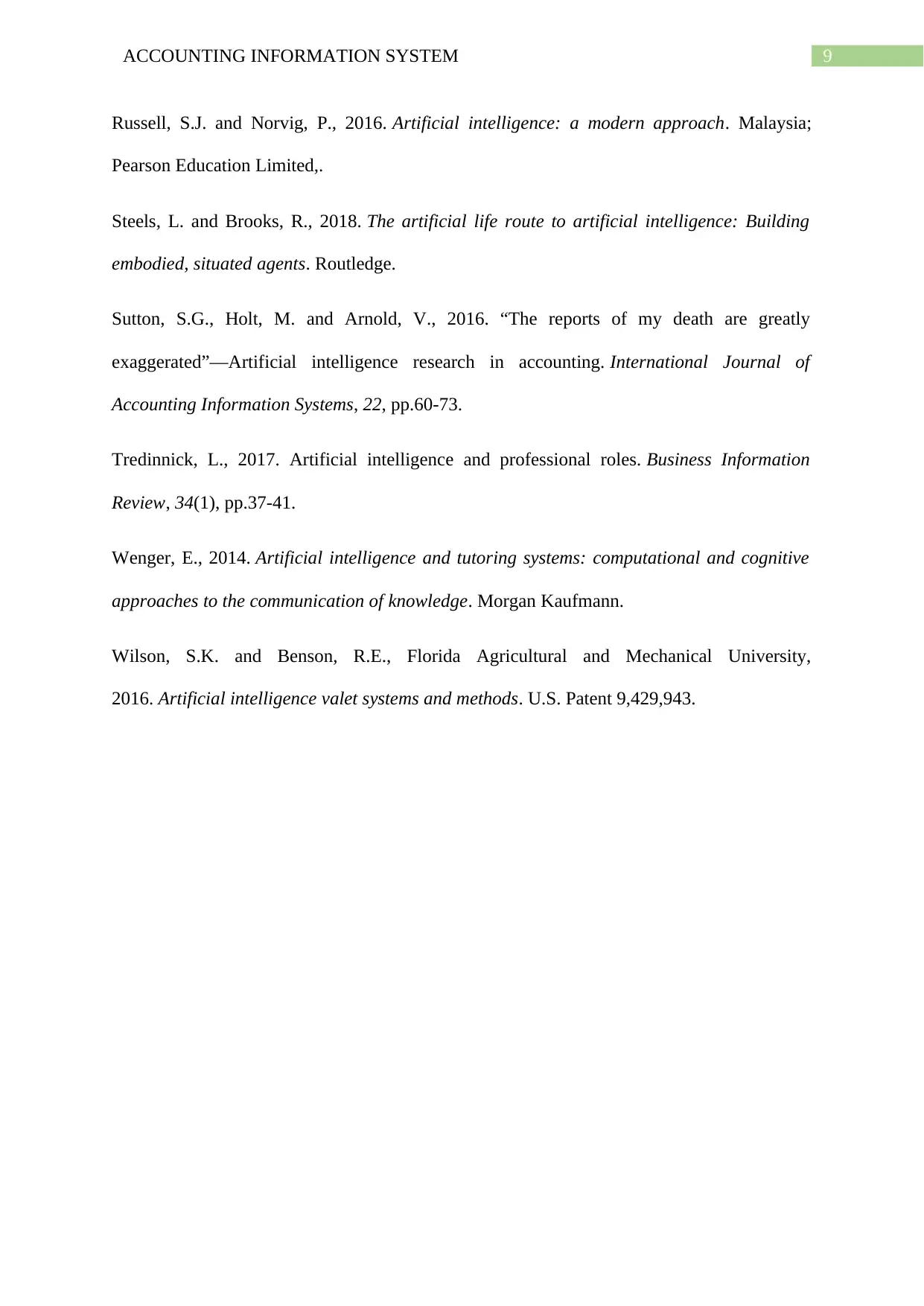
9ACCOUNTING INFORMATION SYSTEM
Russell, S.J. and Norvig, P., 2016. Artificial intelligence: a modern approach. Malaysia;
Pearson Education Limited,.
Steels, L. and Brooks, R., 2018. The artificial life route to artificial intelligence: Building
embodied, situated agents. Routledge.
Sutton, S.G., Holt, M. and Arnold, V., 2016. “The reports of my death are greatly
exaggerated”—Artificial intelligence research in accounting. International Journal of
Accounting Information Systems, 22, pp.60-73.
Tredinnick, L., 2017. Artificial intelligence and professional roles. Business Information
Review, 34(1), pp.37-41.
Wenger, E., 2014. Artificial intelligence and tutoring systems: computational and cognitive
approaches to the communication of knowledge. Morgan Kaufmann.
Wilson, S.K. and Benson, R.E., Florida Agricultural and Mechanical University,
2016. Artificial intelligence valet systems and methods. U.S. Patent 9,429,943.
Russell, S.J. and Norvig, P., 2016. Artificial intelligence: a modern approach. Malaysia;
Pearson Education Limited,.
Steels, L. and Brooks, R., 2018. The artificial life route to artificial intelligence: Building
embodied, situated agents. Routledge.
Sutton, S.G., Holt, M. and Arnold, V., 2016. “The reports of my death are greatly
exaggerated”—Artificial intelligence research in accounting. International Journal of
Accounting Information Systems, 22, pp.60-73.
Tredinnick, L., 2017. Artificial intelligence and professional roles. Business Information
Review, 34(1), pp.37-41.
Wenger, E., 2014. Artificial intelligence and tutoring systems: computational and cognitive
approaches to the communication of knowledge. Morgan Kaufmann.
Wilson, S.K. and Benson, R.E., Florida Agricultural and Mechanical University,
2016. Artificial intelligence valet systems and methods. U.S. Patent 9,429,943.
1 out of 10
Related Documents
Your All-in-One AI-Powered Toolkit for Academic Success.
+13062052269
info@desklib.com
Available 24*7 on WhatsApp / Email
![[object Object]](/_next/static/media/star-bottom.7253800d.svg)
Unlock your academic potential
Copyright © 2020–2026 A2Z Services. All Rights Reserved. Developed and managed by ZUCOL.





